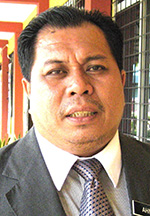
Ahmad Malie
KUCHING: Sarawak Bumiputera Teachers Union welcomes the government’s move to equip the 369 rural schools across the state with hybrid solar system.
Its president Ahmad Malie said a hybrid solar system would be more cost effective than supplying power generators and diesel to those schools in the long run.
“Even though the initial cost is a little higher compared to supplying generators and diesel, hybrid solar system saves cost in the long run.
“Furthermore, hybrid solar system is eco-friendly and will not bring about air pollution,” he told Utusan Borneo yesterday.
He was prompted for comments on the recent incident whereby 369 rural schools in the state faced diesel shortage and were unable to use their generators on the first day of school.
Ahmad hoped that the government would implement the hybrid solar system in those rural schools in the shortest possible time.
He added that the implementation would benefit schools and possibly villages nearby.
“When this type of system is put in place, schools will enjoy constant supply of electricity. Not only will the schools benefit from the system, but villages around the schools may also gain some good from it.”
On Wednesday, the new contractor supplying diesel to the 369 rural schools blamed “irresponsible contractors” for the shortage that caused inconvenience to 30 schools.
According to the contractor, it was also tasked with installing hybrid solar system and the maintenance of generators in those 369 rural schools for a period of three years from Jan 1 this year, with a provision for two years’ extension.
A hybrid solar system generates power in the same way as a traditional grid-feed power system but can also store energy in a battery for later use.
This enables the system to also operate as a back-up power supply during a blackout.
Sarawak Teachers’ Union (STU) also agreed with the government’s move.
Its president Jisin Nyud, however, said the government must make sure that electricity generated by the hybrid solar system would be sufficient to meet the needs.
“It is pertinent for the contractor and the supplier to ensure that no interference will take place, and that power supply to the schools won’t be affected,” he said when contacted yesterday.
Jisin also said the proposal to install hybrid solar system at those rural schools was good because it would save much on the operating costs.
